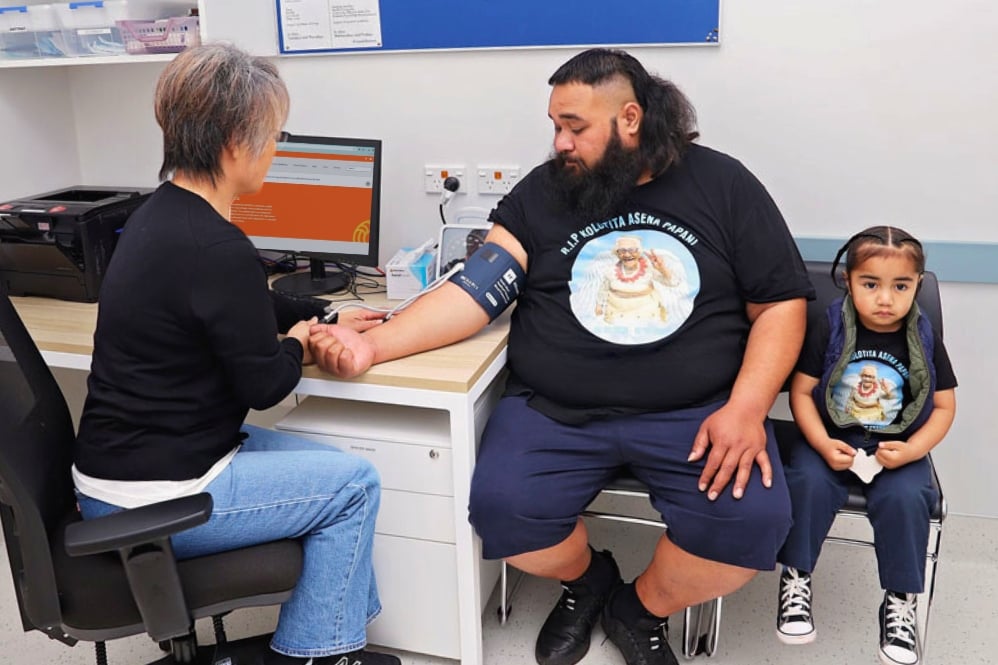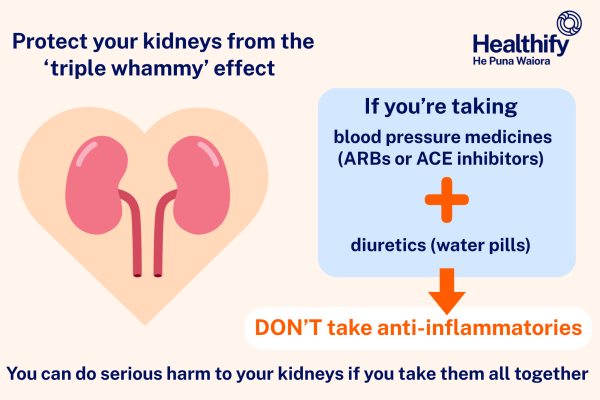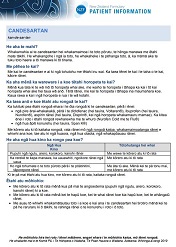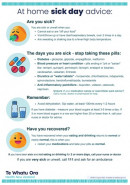Candesartan
Sounds like 'kan-de-sar-tan"
Key points about candesartan
- Candesartan is used to treat high blood pressure and heart failure.
- It also helps protects your kidneys if you have diabetic kidney disease.
- Candesartan is also called Candestar®.
- Find out how to take it safely and the possible side effects.

Candesartan has many different effects on your body and is used to treat a variety of conditions. It belongs to a group of medicines called angiotensin receptor blockers or ARBs. Candesartan may be used for:
- High blood pressure (hypertension) by relaxing your blood vessels and lowering your blood pressure.
- Heart failure to help your heart pump blood more easily. This can help to relieve symptoms such as shortness of breath and swelling of feet, legs and abdomen. It can also help prevent strokes and heart attacks.
- Diabetic kidney disease (diabetic nephropathy) to protect your kidneys and help them function.
In Aotearoa New Zealand, candesartan is only available with a prescription from a prescriber.
In Aotearoa New Zealand, candesartan is available as tablets which come in different strengths: 4 mg, 8 mg, 16 mg and 32 mg.
- The dose of candesartan will be different for different people. Your healthcare provider will tell you the dose that's right for you. Your dose of candesartan will depend on what it's being used for.
- Your healthcare provider will usually start you on a low dose and increase the dose depending on how you respond. This allows your body to get used to the medicine and reduces side effects.
- Always take your candesartan exactly as your healthcare provider has told you. The pharmacy label on your medicine will tell you how much candesartan to take, how often to take it and any special instructions.
- Candesartan tablets are available in different strengths. If your tablets look different to your last supply talk to your healthcare provider or pharmacist about it.
- Timing: Take candesartan once a day, at about the same time each day. Candesartan is best taken in the morning, with or without food.
- Limit or avoid alcohol while you are taking candesartan: Alcohol can increase your chance of side effects such as dizziness and light-headedness.
- Missed dose: If you forget to take your dose, take it as soon as you remember that day. But if it's nearly time for your next dose, just take the next dose at the usual time. Don't take double the dose.
If you're pregnant or planning a pregnancy
Candesartan can affect your baby's kidneys, especially if it's taken in the second and third trimesters of pregnancy. This can result in long term damage to your baby's kidneys. If you're already pregnant, talk to your healthcare provider straight away. Usually they will be able to prescribe a different medicine that's safe to take in pregnancy.
Candesartan should be stopped by the time you're 12 weeks pregnant at the latest. Use contraception if you're taking candesartan and plan any pregnancy with your healthcare provider, pregnancy specialist (obstetrician) or hospital doctor. They will want to review your medical condition and medicine before you get pregnant.
Most women stop taking candesartan before getting pregnant, but some may continue until they have a positive pregnancy test and then stop. Your healthcare provider will discuss what's best for you, based on your medical condition and the risks and benefits of candesartan.
Severe allergic reaction (angioedema)
You shouldn't take candesartan if you've had a severe allergic reaction to an ACE inhibitor in the past, such as swelling of your face, lips, mouth or tongue (called angioedema). Angioedema is a rare but potentially serious side effect and it can be fatal.
Monitoring
Your healthcare provider will arrange for you to have blood tests and blood pressure checks before you start taking candesartan and during your treatment, especially when you first start taking it. This is to check how it's working and to check your kidneys and potassium levels.
Have a sick day plan
If you have diarrhoea (runny poo) or vomiting (being sick) from a stomach bug, or you're dehydrated from another illness, it’s important to let your healthcare provider know. They may advise you to stop taking candesartan for a few days, or decrease the dose and start again when you feel better.
Be careful when taking some pain relief medicines
Candesartan can be used to protect your kidneys from damage if you have diabetes. However, if you're taking candesartan and diuretics (water pills), the combination of these with NSAIDs (anti-inflammatory pain relief medicines) can be very harmful to your kidneys. It can cause acute kidney injury. This combination is called the ‘dangerous trio’ or ‘triple whammy’. You also have a higher risk of harm to your kidneys if you're an older adult (over 65 years) or you're dehydrated.
If you're taking candesartan with a diuretic, do not use NSAIDs for pain relief. Talk to your healthcare provider about safe pain-relief options for you. Read more about NSAIDs and protecting your kidneys.
- Examples of NSAIDs are Ibuprofen (Nurofen, Brufen SR), Diclofenac (Voltaren), Naproxen (Noflam, Naprosyn), Mefenamic acid (Ponstan), Celecoxib (Celebrex), Tenoxicam (Tilcotil).
- Examples of diuretics are furosemide, bumetanide, bendroflumethiazide, chlortalidone, hydrochlorothiazide, indapamide, spironolactone, eplerenone and metolazone.

Image credit: Healthify He Puna Waiora
Read more about the triple whammy effect.
Like all medicines candesartan can cause side effects, although not everyone gets them. If you're concerned about any symptoms you think might be related to your medicine, talk to your healthcare provider. The following information offers some guidance but doesn't include all possible side effects.
Common side effects
Tell your healthcare provider if these side effects bother you.
- Headache.
- Diarrhoea.
- Muscle cramps, muscle weakness
- Dizziness, feeling lightheaded or faint when you stand up. This is quite common when you first start taking candesartan and usually goes way with time. Be careful when getting up from either lying down or sitting to avoid falls. These effects put you at risk of falls and injuries, especially if you're an older adult. Stand up slowly. If you do feel dizzy, sit or lie down for a few moments.
Tell your healthcare provider immediately or phone Healthline free on 0800 611 116 if these occur
- Signs of problems with your liver, such as yellowing of your skin or eyes, dark pee (urine) or pain in your abdomen (tummy).
Phone 111 for an ambulance or go to your nearest accident and emergency (A&E) clinic if these occur
- Signs of an allergic reaction such as itchy skin, and rash, swollen lips or tongue, problems breathing, like a tight chest or shortness of breath.
Read more about medicines and side effects and reporting a reaction you think might be a side effect.
The following links have more information on candesartan:
Candestar(external link) Medsafe Consumer Information Sheet, NZ
Candesartan (external link) New Zealand Formulary Patient Information te reo Māori(external link)
Brochures
Candesartan in te reo Māori(external link) My Medicines, NZ
At home sick day advice(external link) Health New Zealand | Te Whatu Ora, NZ, 2023
Medicines and side effects(external link) Healthify He Puna Waiora, NZ, 2024
5 questions to ask about your medications (external link)Health Quality and Safety Commission, NZ, 2019 English(external link), te reo Māori(external link)
References
- Candesartan(external link) New Zealand Formulary
- Candestar(external link) Medsafe datasheet, NZ
- Reminder – angiotensin converting enzyme inhibitors and angiotensin receptor blockers are contraindicated in pregnancy(external link) Medsafe, NZ, 2024
- Medicines and Hyperkalaemia(external link) Medsafe, NZ, 2015
- Avoiding the triple whammy in primary care – ACE inhibitor/ARB + diuretic + NSAID(external link) BPAC, NZ, 2018
Brochures

My Medicines, NZ

At home sick day advice
Health New Zealand | Te Whatu Ora, 2023

Medicines and side effects
Healthify He Puna Waiora, NZ, 2024
Credits: Healthify editorial team. Healthify is brought to you by Health Navigator Charitable Trust.
Reviewed by: Stephanie Yee, Pharmacist, Auckland.
Last reviewed:
Page last updated:





